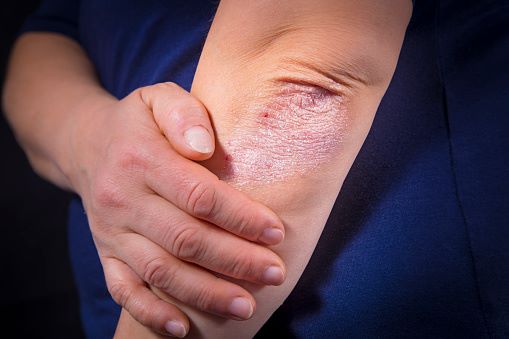How Effective Is Aloe Vera for Psoriasis Treatment?


Did you know that psoriasis affects a whopping 7.5 million Americans? This uncomfortable and annoying skin condition is more common than you might think! If you are dealing with these itchy red patches of skin, you want relief fast. Fortunately, there is a range of safe at-home solutions for treating psoriasis. Options like aloe vera for psoriasis, as well as other creams and over the counter solutions can go a long way in making you feel more comfortable in your own skin.
Ready for a safe and healthy solution? Here’s everything that you need to know about treating your condition and using home remedies like aloe vera for psoriasis.
What Is Psoriasis?
Before we dive into solutions, it is important to understand what exactly psoriasis is. This skin condition is caused when skin cells rise to the surface of the skin too quickly. This causes skin cells to build up too quickly on the surface of the skin. For people with non-problematic skin, new cells come to the surface about once a month. If you have psoriasis, you may have skin cells coming to the surface once a week or more. To the naked eye, these excess skin cells usually come across as red patches.

A red patch of skin can be itchy or just plain painful. These irritated patches typically show up on the elbows, knees, legs, the palm of your hands, or the soles of your feet.
While it affects our skin, psoriasis is actually an immune system disorder. Every person’s immune system has T cells, a type of white blood cell. These T cells are essential to our health because they protect against illness and infect. The condition of psoriasis is caused when these T cells are activated unnecessarily, which causes skin cell growth to come on too quickly.
Psoriasis varies in its severity. According to researchers, around 90 percent of all cases of psoriasis cases are classified as mild, which means that it is annoying but not necessarily damaging to your overall health. By definition, mild cases of psoriasis affect under three percent of your skin. If psoriasis affects anywhere from three percent to ten percent of your skin, it is considered moderate. Finally, if you have psoriasis that affects more than ten percent of the total surface of your skin, it is considered to be severe by the National Psoriasis Foundation. To give you a better idea of what these different levels would look like, you can use your hand as a reference point. The skin on your hand makes up one percent of the total of your skin surface.
Do I Have Psoriasis?
If you have red, itchy skin, there is a chance that you have psoriasis. To the untrained eye, however, it is very difficult to tell the difference between an allergy and psoriasis. It is important to note, however, that psoriasis and allergies are two completely different and unrelated issues.
The bottom line is that only a dermatologist can tell you for sure if you have psoriasis. While playing Doctor Google can help you get to a starting point, it is critical to see a real doctor to get a diagnosis. Psoriasis is easy to treat, but simply ignoring it or treating allergies with solutions meant for psoriasis (or vice versa) can lead to complication and unnecessary discomfort.

How Can I Treat Psoriasis?
When your doctor gives you a diagnosis for psoriasis, it is important to understand that there is no cure for psoriasis. It is a chronic condition that comes and goes. This is really important to keep in mind because a lot of people with psoriasis will find a treatment that eases their symptoms then stop using it once their skin feels better. This is a very bad idea! If your skin is feeling good, keep doing more of the same. Just because your symptoms are relieved does not mean that you have cured your psoriasis. It means that your treatment is working well so you should continue!
When you are first getting started, the National Psoriasis Foundation is an incredible resource. They have support groups and will connect you with other people to share tips and tricks. It’s also the definitive source of all the good info on psoriasis.
As you are working through treatment options, it is also highly recommended to keep a journal. Write down factors that might influence your condition like food, alcohol, and stress. External factors play a major role in outbreaks so it is critical to see what is affecting your symptoms. There are a few key triggers that can cause a psoriasis outbreak so familiarize yourself with them.
Cold and dry weather can cause issues, so winter is a time to be especially vigilant. Stress is a key factor as well, so doctors will also recommend finding ways to manage your stress. Other central lifestyle issues include smoking, drinking, and being overweight. Generally speaking, the more effort you put into being healthy, the fewer outbreaks that you will see. That said, nothing can totally prevent outbreaks of psoriasis.
Using Aloe Vera for Psoriasis Treatment
Doctors and natural health experts alike love aloe vera for psoriasis treatment. It is a simple, natural, and affordable option that works incredibly well. It works as an ideal alternative to moisturizer. Aloe vera for psoriasis affected skin and other sensitive skin types is ideal because there is little chance for irritation.
We love aloe vera for psoriasis because it’s so much easier than choosing a cream from the drugstore! Even many all natural, organic options have countless additives, and you just don’t know how your skin might respond. Aloe vera for psoriasis is perfect when you choose 100 percent pure aloe vera gels that won’t irritate delicate skin.
How to Use Aloe Vera for Psoriasis
One of the easiest ways to use aloe vera for psoriasis is to just apply a pure aloe vera gel cream to your skin three times per day, as recommended by National Psoriasis Foundation. This is a good year-round, daily option. When you are having an outbreak that is causing real irritation, they recommend upgrading to a cream designed for psoriasis that has at least 0.5% aloe vera gel. Many doctors recommend using hydrocortisone cream with aloe vera added in. It is important to be aware, however, that long term use of hydrocortisone cream can actually work to have the opposite effect and irritate your skin with too frequent of use. That is why you should only use it as needed.
It’s also worth noting that oral forms of aloe vera gel like juice and tablets have not been shown to be an effective way of using aloe vera for psoriasis treatment so just stick with the topical options.

